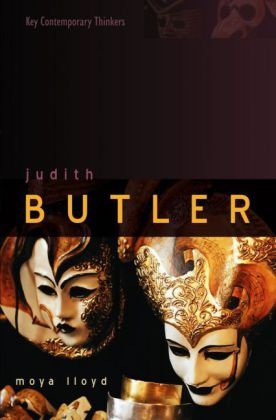Read more
Informationen zum Autor M. Lloyd , Senior Lecturer, Loughborough University Klappentext With the publication of her highly acclaimed and much-cited book Gender Trouble, Judith Butler became one of the most influential feminist theorists of her generation. Her theory of gender performativity and her writings on corporeality, on the injurious capacity of language, on the vulnerability of human life to violence and on the impact of mourning on politics have, taken together, comprised a substantial and highly original body of work that has a wide and truly cross-disciplinary appeal.In this lively book, Moya Lloyd provides both a clear exposition and an original critique of Butler's work. She examines Butlers core ideas, traces the development of her thought from her first book to her most recent work, and assesses Butlers engagements with the philosophies of Hegel, Foucault, Derrida, Irigaray and de Beauvoir, as well as addressing the nature and impact of Butler's writing on feminist theory. Throughout Lloyd is particularly concerned to examine Butler's political theory, including her critical interventions in such contemporary political controversies as those surrounding gay marriage, hate-speech, human rights, and September 11 and its aftermath.Judith Butler offers an accessible and original contribution to existing debates that will be an invaluable resource for students and scholars alike. Zusammenfassung With the publication of her highly acclaimed and much-cited book Gender Trouble, Judith Butler became one of the most influential feminist theorists of her generation. Her theory of gender performativity and her writings on corporeality, on the injurious capacity of language, on the vulnerability of human life to violence and on the impact of mourning on politics have, taken together, comprised a substantial and highly original body of work that has a wide and truly cross-disciplinary appeal.In this lively book, Moya Lloyd provides both a clear exposition and an original critique of Butler's work. She examines Butlers core ideas, traces the development of her thought from her first book to her most recent work, and assesses Butlers engagements with the philosophies of Hegel, Foucault, Derrida, Irigaray and de Beauvoir, as well as addressing the nature and impact of Butler's writing on feminist theory. Throughout Lloyd is particularly concerned to examine Butler's political theory, including her critical interventions in such contemporary political controversies as those surrounding gay marriage, hate-speech, human rights, and September 11 and its aftermath.Judith Butler offers an accessible and original contribution to existing debates that will be an invaluable resource for students and scholars alike. Inhaltsverzeichnis Abbreviations x Acknowledgements xii 1 Introduction 1 Feminism, identity and difference 4 From homosexual to gay and lesbian to queer 7 The influence of poststructuralism 10 Hegel and desiring subjects 13 Postscript 23 2 Rethinking Sex and Gender 25 The trouble with women 25 Feminism and the sex/gender debate 28 Denaturalizing sex and gender 30 Cultural intelligibility - contesting heteronormativity 33 From phenomenology to performativity 36 Performing gender 42 Women in/and feminism 44 Conclusion 46 3 Towards a Subversive Gender Politics 49 From parody to politics 50 Subversive gender politics 51 Performativity and subversion 54 Free will versus determinism 57 Enter iterability 61 The ambivalence of drag 66 The matter of bodies 68 Politicizing abjection - making bodies matter 74 Conclusion 76 4 Psychoanalysis and the Gendered Subject 78 Gender Trouble and psychoanalysis 79 Rubin and 'The Traffic in Women' 80 Fr...
List of contents
* Contents
* Abbreviations
* Acknowledgements
*
* Chapter One: Introduction
* Chapter Two: Rethinking sex and gender
* Chapter Three: Towards a subversive gender politics
* Chapter Four: Psychoanalysis and gendered subjectivity
* Chapter Five: 'Talking back': resignification and politics
* Chapter Six: What makes for a liveable life?
* Bibliography
Report
"An original and engaging overview of Butler s body of work."
Australian Journal of Political Science
"For students and faculty struggling to understand Judith Butler, I strongly recommend this book. Lloyd proves to be a reliable guide who is not afraid to engage critically with Butler's gender theory and politics."
Steven Seidman, University at Albany, State University of New York
"Moya Lloyd's careful reading of the work of Judith Butler is a gift of scholarly generosity. With insight and precision, Lloyd sets out the themes, questions and contexts driving Butler's philosophy. This important book will benefit beginning and advanced readers of Butler as it traces the deep connections between the body, language, ethics and politics extending throughout her thought."
Jodi Dean, Hobart and William Smith Colleges

